German actor Harry Liedtke (1882-1945) was the charming ladykiller of many early silent classics. Detective serials like Joe Deebs made him one of the first male stars of the German cinema.

German postcard by Photochemie, Berlin, no. K. 3050. Photo: Mac Walten, Berlin.

German postcard by Photochemie, Berlin, no. K. 3055. Photo: Mac Walten, Berlin.

German postcard by Photochemie, Berlin, no. K. 2850. Photo: Union. Pola Negri as Carmen and Harry Liedtke as Don José in the German silent drama Carmen (Ernst Lubitsch, 1918).

German postcard by Ross Verlag, Berlin, no. 611/1. Photo: Union Film. Ossi Oswalda and Harry Liedtke in Die Austernprinzessin (Ernst Lubitsch, 1919).
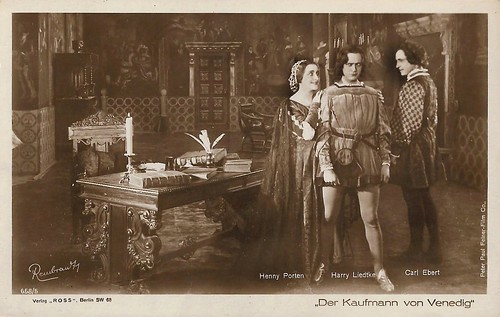
German postcard by Ross Verlag, Berlin, no. 658/5. Photo: Rembrandt / Peter Paul Felner-Film Co. Henny Porten as Porzia, Harry Liedtke as Bassanio, and Carl Ebert as Antonio in Der Kaufmann von Venedig/The Merchant of Venice (Peter Paul Felner, 1923).
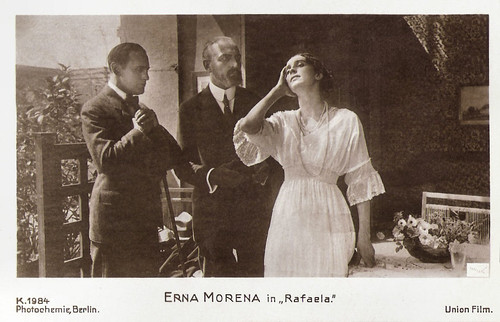
German postcard by Photochemie, Berlin, no. K. 1984. Photo: Union-Film. Erna Morena, Harry Liedtke and Magnus Stifter in Rafaela/Wer weiss? (Arsen von Cserépy, 1917).

German postcard by Ross Verlag, no. 284/4, 1919-1924. Photo: Atelier Binder, Berlin.

German postcard by Ross Verlag, no. 463/1, 1919-1924. Photo: Riess.

German postcard by Ross Verlag, no. 482/1, 1919-1924. Photo: Becker & Maass, Berlin.

German postcard by Ross Verlag, Berlin, no. 1691/1, 1927-1928. Photo: Deutsch-Nordische Film-Union. Harry Liedtke in Eine tolle Nacht/A Crazy Night (Richard Oswald, 1927).
Harry Liedtke was born in Königsberg, East Prussia (today: Kaliningrad, Russia) in 1882. He was the seventh of eleven children of an import and export merchant who dealt with linseed and hemp. After the death of his father in 1896, he grew up in an orphanage and began a qualification in the retail business.
During a visit to Berlin, Liedtke met Hans Oberländer, the artistic director of Königliches Schauspielhaus. After several acting lessons, he became a cast member at Stadttheater Freiberg, Saxony. He had some more theatre engagements, and in 1908 he went to New York for one year to play at the New German Theatre.
After his return in Germany, his career finally got ahead with engagements at the Hof- und Nationaltheater in Mannheim and the Residenz-Theater and Deutschen Theater in Berlin.
Very early he came in contact with the medium film. In 1912 he made his film debut in Zu spät/Too Late (Carl Froelich, 1912), produced by film pioneer Oskar Messter. In the following years, he personified the elegant gentleman and youthful charmer in many productions of the Messter studio, like Eva (Curt A. Stark, 1913) starring Henny Porten, and Schuldig/Guilty (Hans Oberländer, 1914) with Leopoldine Konstantin.
In 1916 he became a widely popular star as the detective Joe Deebs in short adventure films like Wie ich Detektiv wurde/How I Became Detective (Joe May, 1916), and Das Rätselhafte Inserat/The Mysterious Advertisement (Karl Gerhardt, Joe May, 1916).

German postcard by Photochemie, Berlin, no. K. 2023. Photo: Union-Film. Harry Liedtke in Eine Nacht in der Stahlkammer/A night in the vault (Felix Basch, 1917).

German postcard by Ross Verlag, Berlin, no. 627/2, 1919-1924. Photo: Union. Pola Negri and Harry Liedtke in Madame DuBarry (Ernst Lubitsch, 1919).

German postcard by Ross Verlag, no. 656/2. Photo: Maxim Film. Harry Liedtke as Johan Friedrich Struensee, physician and lover of the Danish queen (Henny Porten) in Struensee/Der Liebe einer Königin (Ludwig Wolff, 1923).
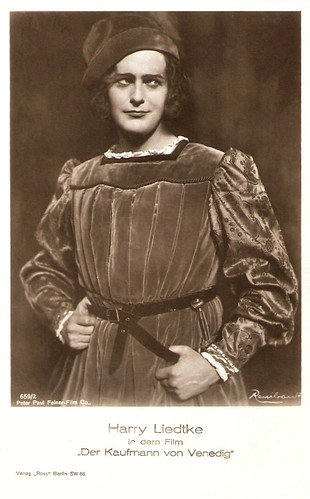
German postcard by Ross Verlag, no. 659/2, 1919-1924. Photo: Rembrandt / Peter Paul Felner Film Co. Harry Liedtke in Der Kaufmann von Venedig/The Merchant Of Venice (Peter Paul Felner, 1923).
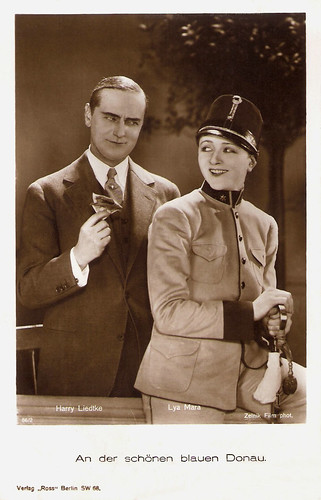
German postcard by Ross Verlag, no. 56/2, 1925-1926. Photo: Zelnik Film. Lya Mara and Harry Liedtke in An der schönen blauen Donau/The Beautiful Blue Danube (Friedrich Zelnik, 1926). Collection: Geoffrey Donaldson Institute.
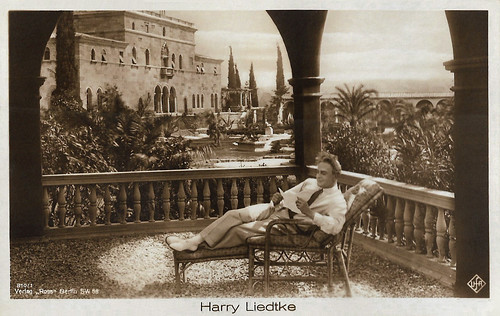
German postcard by Ross Verlag, no. 810/1. Ufa. Harry Liedtke in Die Finanzen des Großherzogs/The Grand Duke's Finances (F. W. Murnau, 1924).
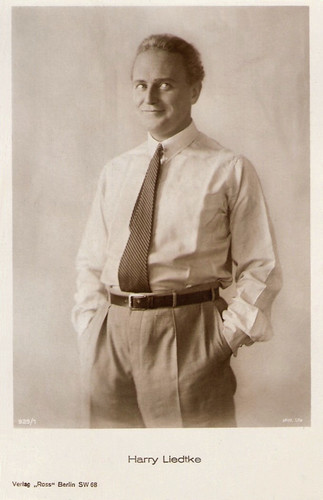
German postcard by Ross Verlag, Berlin, no. 925/1, 1925-1926. Photo: Ufa.
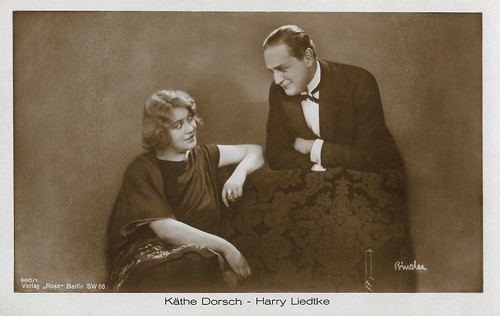
German postcard by Ross Verlag, no. 980/1, 1925-1926. Photo: Alex Binder. Käthe Dorsch and Harry Liedtke in Muß die Frau Mutter werden/Paragraph 144 (Georg Jacoby, Hans Otto, 1924).

German postcard by Ross Verlag, Berlin, no. 1622/3, 1927-1928. Photo: Zelnick Film.

German postcard by Ross Verlag, no. 1632/1. Photo: Fox. Harry Liedtke in Madame wünscht keine Kinder (Alexander Korda, 1926).
Now, famous directors wanted Harry Liedtke for their films, and he developed into one of the first male stars of German cinema.
With director Paul Leni, he made Prima Vera/Camille (1917) opposite Erna Morena, Dornröschen/The Sleeping Beauty (1917) with his wife Käthe Dorsch, and Das Rätsel von Bangalor/The Mystery of Bangalore (Paul Leni, Alexander Antalffy, 1918) with Conrad Veidt.
With Ernst Lubitsch, Liedtke celebrated great successes in the 'Fledermaus' adaptation Das fidele Gefängnis/The Merry Jail (1917) with Ossi Oswalda, Der Rodelkavalier (1918), Die Augen der Mumie Ma/The Eyes of the Mummy Ma (1918) with Emil Jannings, Das Mädel vom Ballet/The Ballet Girl(1918), Carmen (1918) with Pola Negri, Die Austernprinzessin/The Oyster Princess (1919), Madame Dubarry (1919), Sumurun/One Arabian Night (1920), and Das Weib des Pharao/The Wife of the Pharaoh (1922) with Dagny Servaes.
Other popular films were the Frank Wedekind adaptation Lulu (Alexander Antalffy, 1917) with Erna Morena, the Detective series Der Mann ohne Namen/The Man Without a Name (Georg Jacoby, 1921), the comedy Die Finanzen des Grossherzogs/The Grand Duke's Finances (F.W. Murnau, 1924) starring Alfred Abel, Nanon (Hanns Schwarz, 1924) starring countess Agnes Esterhazy, and Der Feldherrnhügel(1926) with Olga Tschechova.

German postcard by Ross Verlag, Berlin, no. 91/1. Photo: Aafa. Agnes Estherhazy and Harry Liedtke in Der Bettelstudent/The Beggar Student (Jacob Fleck, Luise Fleck, 1927).

German postcard by Ross Verlag, Berlin, no. 1719/1, 1927-1928. Photo: Arthur Ziehm, Berlin. Conrad Veidt and Harry Liedtke in Kreuzzug des Weibes/The Wife's Crusade (Martin Berger, 1926).

German postcard by Ross Verlag, Berlin, no. 2070/1, 1927-1928. Photo: National. Harry Liedtke and Lee Parry in Regine, die Tragödie einer Frau/Two Women (Erich Waschneck, 1927).

German postcard by Ross Verlag, Berlin, no. 3031/1, 1928-1929. Photo: R. Grunemann, Frankfurt/Oder.
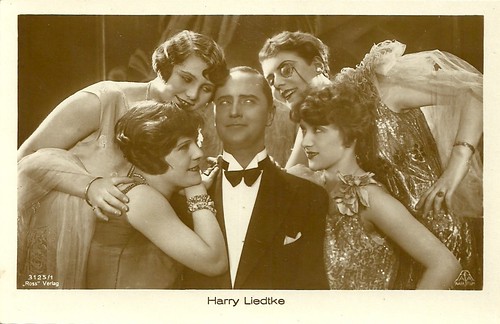
German postcard by Ross Verlag, no. 3125/1, 1928-1929. Photo: Aafa Film.

German postcard by Ross Verlag, Berlin, no. 3417/1, 1928-1929. Photo: Phoebus-Film AG. Christa Tordy and Harry Liedtke in Amor auf Ski/Cupid on skis (Rolf Randolf, 1928).

German postcard by Ross Verlag, Berlin, no. 3417/2, 1928-1929. Photo: Phoebus-Film. Harry Liedtke and Christa Tordy in Amor auf Ski/Cupid on skis (Rolf Randolf, 1928).

German postcard by Ross Verlag, no. 3642/2, 1928-1929. Photo: Aafa Film. Harry Liedtke and Hilda Rosch in Das Spiel mit der Liebe/The Game of Love (Victor Janson, 1928).

German postcard by Ross Verlag, no. 3957/2, 1928-1929. Photo: Aafa Film. Harry Liedtke in Der Faschingsprinz/The carnival prince (Rudolf Walther-Fein, 1928).

German postcard by Ross Verlag, no. 4361/1, 1929-1930. Photo: Alex Binder, Berlin. Marianne Winkelstern and Harry Liedtke in Die Zirkusprinzessin/The Circus Princess (Victor Janson, 1929).
In the second half of the 1920s, Harry Liedtke appeared in many silent operettas such as Liebe und Trompetenblasen/Love and Trumpet Playing (Richard Eichberg, 1925) with Lilian Harvey, Die Försterchristel/The Bohemian Dancer (Friedrich Zelnik, 1926) with Lya Mara, and Ich küsse Ihre Hand, Madame/I Kiss Your Hand Madame (Robert Land, 1929) with Marlene Dietrich.
When the sound film arrived Liedtke’s career slackened off. His voice turned out to be unsuitable. He got supporting roles in such films as Preußische Liebesgeschichte/A Prussian Love Story (Paul Martin, 1938) with Willy Fritsch, and Quax, der Bruchpilot/Quax, the Crashing Pilot (Kurt Hoffmann, 1941), but leading roles were leftover more rarely.
He changed inevitably from a ladykiller to a graying gentleman. With his leading role in the comedy Sophienlund (Heinz Rühmann, 1942) he could prove his acting skills. His final role was the lead in Das Konzert/The Concert (Paul Verhoeven, 1944).
During the invasion of the Red Army in April 1945, Harry Liedtke and his third wife, actress Christa Tordy were murdered by Soviet soldiers in their own house in Bad Saarow-Pieskow. One of the Russians smashed a bottle over Liedtke's head when he tried to save his wife from being raped.
Harry Liedtke first had been married to Hanne Schutt. From 1920 till 1928, Liedtke was married to the actress Käthe Dorsch.

German postcard by Ross Verlag, Berlin, no. 981/2, 1925-1926. Photo: Alex Binder, Berlin.

German postcard by Ross Verlag, Berlin, no. 981/3, 1925-1926. Photo: Alex Binder.

German postcard by Ross Verlag, Berlin, no. 1280/3, 1927-1928. Photo: Hanni Schwarz, Berlin.

German postcard by Ross Verlag, Berlin, no. 1674/3, 1927-1928.

German postcard by Ross Verlag, Berlin, no. 1812/2, 1927-1928. Photo: Hanni Schwarz, Berlin.

German postcard by Ross Verlag, no. 3181/2, 1928-1929. Photo: Alex Binder, Berlin.

German postcard by Ross Verlag, no. 3592/1, 1928-1929. Photo: Hanni Schwarz, Berlin.
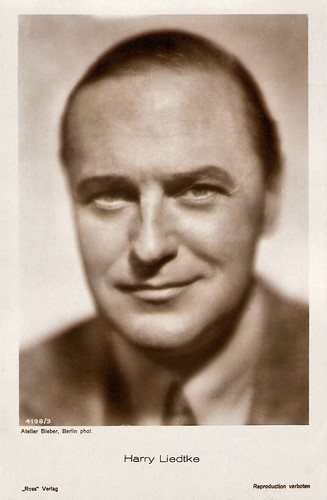
German postcard by Ross Verlag, no. 4189/3, 1929-1930. Photo: Atelier Binder, Berlin.

German postcard by Ross Verlag, no. 5273/2, 1930-1931. Photo: Atelier Guldenberg, Berlin.

German postcard by Film-Foto-Verlag, Berlin, no. A 3775/1, 1941-1944. Photo: Baumann / Terra.
Sources: Thomas Staedeli (Cyranos), Stephanie D'heil (Steffi-line - German), Wikipedia (German), Filmportal.de, and IMDb. This post was last updated on 8 July 2021.

German postcard by Photochemie, Berlin, no. K. 3050. Photo: Mac Walten, Berlin.

German postcard by Photochemie, Berlin, no. K. 3055. Photo: Mac Walten, Berlin.

German postcard by Photochemie, Berlin, no. K. 2850. Photo: Union. Pola Negri as Carmen and Harry Liedtke as Don José in the German silent drama Carmen (Ernst Lubitsch, 1918).

German postcard by Ross Verlag, Berlin, no. 611/1. Photo: Union Film. Ossi Oswalda and Harry Liedtke in Die Austernprinzessin (Ernst Lubitsch, 1919).

German postcard by Ross Verlag, Berlin, no. 658/5. Photo: Rembrandt / Peter Paul Felner-Film Co. Henny Porten as Porzia, Harry Liedtke as Bassanio, and Carl Ebert as Antonio in Der Kaufmann von Venedig/The Merchant of Venice (Peter Paul Felner, 1923).

German postcard by Photochemie, Berlin, no. K. 1984. Photo: Union-Film. Erna Morena, Harry Liedtke and Magnus Stifter in Rafaela/Wer weiss? (Arsen von Cserépy, 1917).

German postcard by Ross Verlag, no. 284/4, 1919-1924. Photo: Atelier Binder, Berlin.

German postcard by Ross Verlag, no. 463/1, 1919-1924. Photo: Riess.

German postcard by Ross Verlag, no. 482/1, 1919-1924. Photo: Becker & Maass, Berlin.

German postcard by Ross Verlag, Berlin, no. 1691/1, 1927-1928. Photo: Deutsch-Nordische Film-Union. Harry Liedtke in Eine tolle Nacht/A Crazy Night (Richard Oswald, 1927).
Elegant Gentleman
Harry Liedtke was born in Königsberg, East Prussia (today: Kaliningrad, Russia) in 1882. He was the seventh of eleven children of an import and export merchant who dealt with linseed and hemp. After the death of his father in 1896, he grew up in an orphanage and began a qualification in the retail business.
During a visit to Berlin, Liedtke met Hans Oberländer, the artistic director of Königliches Schauspielhaus. After several acting lessons, he became a cast member at Stadttheater Freiberg, Saxony. He had some more theatre engagements, and in 1908 he went to New York for one year to play at the New German Theatre.
After his return in Germany, his career finally got ahead with engagements at the Hof- und Nationaltheater in Mannheim and the Residenz-Theater and Deutschen Theater in Berlin.
Very early he came in contact with the medium film. In 1912 he made his film debut in Zu spät/Too Late (Carl Froelich, 1912), produced by film pioneer Oskar Messter. In the following years, he personified the elegant gentleman and youthful charmer in many productions of the Messter studio, like Eva (Curt A. Stark, 1913) starring Henny Porten, and Schuldig/Guilty (Hans Oberländer, 1914) with Leopoldine Konstantin.
In 1916 he became a widely popular star as the detective Joe Deebs in short adventure films like Wie ich Detektiv wurde/How I Became Detective (Joe May, 1916), and Das Rätselhafte Inserat/The Mysterious Advertisement (Karl Gerhardt, Joe May, 1916).

German postcard by Photochemie, Berlin, no. K. 2023. Photo: Union-Film. Harry Liedtke in Eine Nacht in der Stahlkammer/A night in the vault (Felix Basch, 1917).

German postcard by Ross Verlag, Berlin, no. 627/2, 1919-1924. Photo: Union. Pola Negri and Harry Liedtke in Madame DuBarry (Ernst Lubitsch, 1919).

German postcard by Ross Verlag, no. 656/2. Photo: Maxim Film. Harry Liedtke as Johan Friedrich Struensee, physician and lover of the Danish queen (Henny Porten) in Struensee/Der Liebe einer Königin (Ludwig Wolff, 1923).

German postcard by Ross Verlag, no. 659/2, 1919-1924. Photo: Rembrandt / Peter Paul Felner Film Co. Harry Liedtke in Der Kaufmann von Venedig/The Merchant Of Venice (Peter Paul Felner, 1923).

German postcard by Ross Verlag, no. 56/2, 1925-1926. Photo: Zelnik Film. Lya Mara and Harry Liedtke in An der schönen blauen Donau/The Beautiful Blue Danube (Friedrich Zelnik, 1926). Collection: Geoffrey Donaldson Institute.

German postcard by Ross Verlag, no. 810/1. Ufa. Harry Liedtke in Die Finanzen des Großherzogs/The Grand Duke's Finances (F. W. Murnau, 1924).

German postcard by Ross Verlag, Berlin, no. 925/1, 1925-1926. Photo: Ufa.

German postcard by Ross Verlag, no. 980/1, 1925-1926. Photo: Alex Binder. Käthe Dorsch and Harry Liedtke in Muß die Frau Mutter werden/Paragraph 144 (Georg Jacoby, Hans Otto, 1924).

German postcard by Ross Verlag, Berlin, no. 1622/3, 1927-1928. Photo: Zelnick Film.

German postcard by Ross Verlag, no. 1632/1. Photo: Fox. Harry Liedtke in Madame wünscht keine Kinder (Alexander Korda, 1926).
Lubitsch
Now, famous directors wanted Harry Liedtke for their films, and he developed into one of the first male stars of German cinema.
With director Paul Leni, he made Prima Vera/Camille (1917) opposite Erna Morena, Dornröschen/The Sleeping Beauty (1917) with his wife Käthe Dorsch, and Das Rätsel von Bangalor/The Mystery of Bangalore (Paul Leni, Alexander Antalffy, 1918) with Conrad Veidt.
With Ernst Lubitsch, Liedtke celebrated great successes in the 'Fledermaus' adaptation Das fidele Gefängnis/The Merry Jail (1917) with Ossi Oswalda, Der Rodelkavalier (1918), Die Augen der Mumie Ma/The Eyes of the Mummy Ma (1918) with Emil Jannings, Das Mädel vom Ballet/The Ballet Girl(1918), Carmen (1918) with Pola Negri, Die Austernprinzessin/The Oyster Princess (1919), Madame Dubarry (1919), Sumurun/One Arabian Night (1920), and Das Weib des Pharao/The Wife of the Pharaoh (1922) with Dagny Servaes.
Other popular films were the Frank Wedekind adaptation Lulu (Alexander Antalffy, 1917) with Erna Morena, the Detective series Der Mann ohne Namen/The Man Without a Name (Georg Jacoby, 1921), the comedy Die Finanzen des Grossherzogs/The Grand Duke's Finances (F.W. Murnau, 1924) starring Alfred Abel, Nanon (Hanns Schwarz, 1924) starring countess Agnes Esterhazy, and Der Feldherrnhügel(1926) with Olga Tschechova.

German postcard by Ross Verlag, Berlin, no. 91/1. Photo: Aafa. Agnes Estherhazy and Harry Liedtke in Der Bettelstudent/The Beggar Student (Jacob Fleck, Luise Fleck, 1927).

German postcard by Ross Verlag, Berlin, no. 1719/1, 1927-1928. Photo: Arthur Ziehm, Berlin. Conrad Veidt and Harry Liedtke in Kreuzzug des Weibes/The Wife's Crusade (Martin Berger, 1926).

German postcard by Ross Verlag, Berlin, no. 2070/1, 1927-1928. Photo: National. Harry Liedtke and Lee Parry in Regine, die Tragödie einer Frau/Two Women (Erich Waschneck, 1927).

German postcard by Ross Verlag, Berlin, no. 3031/1, 1928-1929. Photo: R. Grunemann, Frankfurt/Oder.

German postcard by Ross Verlag, no. 3125/1, 1928-1929. Photo: Aafa Film.

German postcard by Ross Verlag, Berlin, no. 3417/1, 1928-1929. Photo: Phoebus-Film AG. Christa Tordy and Harry Liedtke in Amor auf Ski/Cupid on skis (Rolf Randolf, 1928).

German postcard by Ross Verlag, Berlin, no. 3417/2, 1928-1929. Photo: Phoebus-Film. Harry Liedtke and Christa Tordy in Amor auf Ski/Cupid on skis (Rolf Randolf, 1928).

German postcard by Ross Verlag, no. 3642/2, 1928-1929. Photo: Aafa Film. Harry Liedtke and Hilda Rosch in Das Spiel mit der Liebe/The Game of Love (Victor Janson, 1928).

German postcard by Ross Verlag, no. 3957/2, 1928-1929. Photo: Aafa Film. Harry Liedtke in Der Faschingsprinz/The carnival prince (Rudolf Walther-Fein, 1928).

German postcard by Ross Verlag, no. 4361/1, 1929-1930. Photo: Alex Binder, Berlin. Marianne Winkelstern and Harry Liedtke in Die Zirkusprinzessin/The Circus Princess (Victor Janson, 1929).
Silent operettas
In the second half of the 1920s, Harry Liedtke appeared in many silent operettas such as Liebe und Trompetenblasen/Love and Trumpet Playing (Richard Eichberg, 1925) with Lilian Harvey, Die Försterchristel/The Bohemian Dancer (Friedrich Zelnik, 1926) with Lya Mara, and Ich küsse Ihre Hand, Madame/I Kiss Your Hand Madame (Robert Land, 1929) with Marlene Dietrich.
When the sound film arrived Liedtke’s career slackened off. His voice turned out to be unsuitable. He got supporting roles in such films as Preußische Liebesgeschichte/A Prussian Love Story (Paul Martin, 1938) with Willy Fritsch, and Quax, der Bruchpilot/Quax, the Crashing Pilot (Kurt Hoffmann, 1941), but leading roles were leftover more rarely.
He changed inevitably from a ladykiller to a graying gentleman. With his leading role in the comedy Sophienlund (Heinz Rühmann, 1942) he could prove his acting skills. His final role was the lead in Das Konzert/The Concert (Paul Verhoeven, 1944).
During the invasion of the Red Army in April 1945, Harry Liedtke and his third wife, actress Christa Tordy were murdered by Soviet soldiers in their own house in Bad Saarow-Pieskow. One of the Russians smashed a bottle over Liedtke's head when he tried to save his wife from being raped.
Harry Liedtke first had been married to Hanne Schutt. From 1920 till 1928, Liedtke was married to the actress Käthe Dorsch.

German postcard by Ross Verlag, Berlin, no. 981/2, 1925-1926. Photo: Alex Binder, Berlin.

German postcard by Ross Verlag, Berlin, no. 981/3, 1925-1926. Photo: Alex Binder.

German postcard by Ross Verlag, Berlin, no. 1280/3, 1927-1928. Photo: Hanni Schwarz, Berlin.

German postcard by Ross Verlag, Berlin, no. 1674/3, 1927-1928.

German postcard by Ross Verlag, Berlin, no. 1812/2, 1927-1928. Photo: Hanni Schwarz, Berlin.

German postcard by Ross Verlag, no. 3181/2, 1928-1929. Photo: Alex Binder, Berlin.

German postcard by Ross Verlag, no. 3592/1, 1928-1929. Photo: Hanni Schwarz, Berlin.

German postcard by Ross Verlag, no. 4189/3, 1929-1930. Photo: Atelier Binder, Berlin.

German postcard by Ross Verlag, no. 5273/2, 1930-1931. Photo: Atelier Guldenberg, Berlin.

German postcard by Film-Foto-Verlag, Berlin, no. A 3775/1, 1941-1944. Photo: Baumann / Terra.
Sources: Thomas Staedeli (Cyranos), Stephanie D'heil (Steffi-line - German), Wikipedia (German), Filmportal.de, and IMDb. This post was last updated on 8 July 2021.
1 comment:
there's a fascinating progression in the postcards here - the expression stays virtually the same as the face ages...i've not noticed this being quite so apparent in previous posts! happy PFF!
Post a Comment